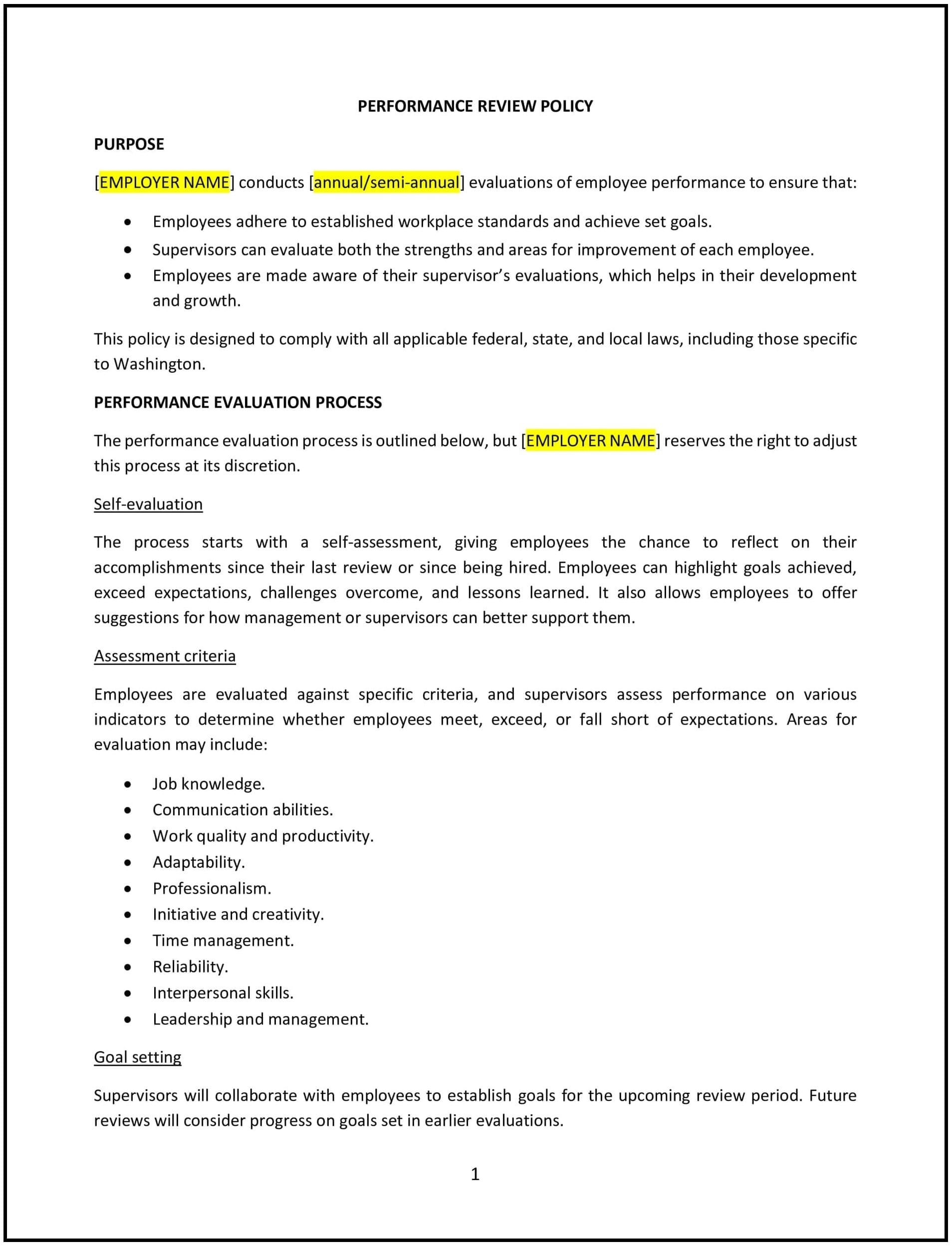Performance review policy (Washington): Free template
Got contracts to review? While you're here for policies, let Cobrief make contract review effortless—start your free review now.

Customize this template for free
This performance review policy is designed to help Washington businesses establish clear and consistent guidelines for conducting employee performance evaluations. The policy outlines the process for evaluating employee performance, setting expectations, and providing feedback, including how frequently performance reviews should be conducted. It helps ensure that performance reviews are fair, transparent, and aligned with the company’s goals, as well as compliance with Washington state labor laws.
By adopting this policy, businesses can improve employee development, enhance communication, and foster a performance-oriented culture that benefits both employees and the organization.
How to use this performance review policy (Washington)
- Define performance expectations: The policy should outline how performance expectations are set for employees, including key performance indicators (KPIs), goals, and competencies that employees are expected to meet. This ensures that employees understand what is expected of them and how their performance will be evaluated.
- Establish the frequency of reviews: The policy should specify how often performance reviews will be conducted. For example, performance reviews may occur annually, semi-annually, or quarterly. The policy should set clear timelines for when employees will receive feedback and evaluations.
- Provide guidance on the review process: The policy should outline how the performance review process works, including the roles and responsibilities of both managers and employees. It should specify whether reviews will be self-assessments, manager evaluations, or a combination of both.
- Set criteria for evaluation: The policy should provide clear criteria for evaluating employee performance, such as job performance, behavior, skills, and adherence to company values. It should also specify how managers should provide constructive feedback and identify areas for improvement.
- Address employee development and goal setting: The policy should ensure that performance reviews are not just about evaluating past performance, but also about identifying opportunities for employee growth and development. It should outline how employees and managers will work together to set goals for improvement and career progression.
- Establish documentation and record-keeping procedures: The policy should specify how performance reviews will be documented and stored. This ensures that there is a record of each review, feedback provided, and goals set, which can be useful for future performance evaluations, promotions, or other decisions.
- Ensure compliance with Washington state and federal laws: The policy should comply with Washington state laws regarding performance evaluations, including anti-discrimination and equal opportunity regulations. It should also align with federal regulations related to employee evaluations and compensation.
- Review and update regularly: Periodically review and update the policy to ensure it remains compliant with Washington state laws, federal regulations, and any changes in the company’s performance management practices. Regular updates will help ensure the policy stays relevant and effective.
Benefits of using this performance review policy (Washington)
This policy offers several benefits for Washington businesses:
- Enhances employee development: By providing regular performance reviews, the policy supports ongoing employee development, helping employees grow in their roles and achieve their career goals.
- Improves communication: The policy fosters open communication between managers and employees, ensuring that feedback is provided regularly and employees understand where they stand in terms of performance and expectations.
- Increases fairness and transparency: The policy ensures that performance evaluations are based on clear, consistent criteria, which increases transparency and fairness in the evaluation process.
- Supports goal setting and alignment: The policy encourages employees and managers to set goals together, aligning individual performance with the company’s overall objectives, and ensuring that everyone is working towards the same goals.
- Promotes accountability: By establishing a structured process for performance evaluations, the policy helps hold employees accountable for their performance and behavior, driving improved productivity and performance.
- Reduces legal risks: The policy helps ensure that performance reviews are conducted fairly and in compliance with Washington state and federal employment laws, reducing the risk of discrimination claims or other legal issues.
Tips for using this performance review policy (Washington)
- Communicate the policy clearly: Ensure all employees are aware of the performance review policy and understand the process, criteria, and expectations. Include the policy in the employee handbook and review it during onboarding.
- Prepare for reviews in advance: Managers should prepare for performance reviews by gathering feedback, reviewing goals, and reflecting on the employee’s progress. This helps ensure that the review is thorough, objective, and focused on development.
- Set SMART goals: When setting goals for employees, make sure they are SMART (Specific, Measurable, Achievable, Relevant, and Time-bound). This ensures that goals are clear and attainable, making it easier to track progress.
- Provide constructive feedback: Performance reviews should focus on both strengths and areas for improvement. Ensure that feedback is constructive, actionable, and focuses on helping employees improve their performance and grow within the organization.
- Document the review: Keep a written record of each performance review, including feedback provided, goals set, and any follow-up actions agreed upon. This documentation is useful for future evaluations and decision-making.
- Monitor progress: After the performance review, regularly check in with employees to track progress on goals and provide ongoing support. This ensures that employees stay on track and have the resources they need to succeed.
- Review and update regularly: Periodically review the policy to ensure it remains compliant with Washington state laws, federal regulations, and any changes in the company’s performance management practices. Regular updates will help keep the policy relevant and effective.